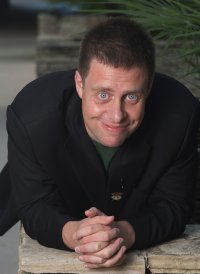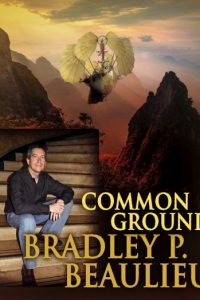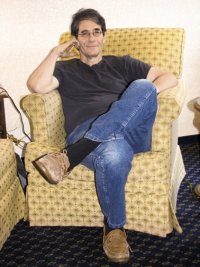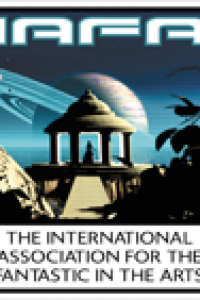Paul Cornell: Impossible Things
 Paul Cornell was born July 18, 1967, in the West Country of Britain. He got his start as a writer doing Doctor Who tie-in work, producing a number of novels starting in 1991. Beginning in the mid-’90s he also wrote for various British television programs, including Doctor Who; he scripted the Hugo Award nominated episodes ‘‘Father’s Day’’ (2005) and the two-part ‘‘Human Nature’’/’’The Family of Blood’’ (2006), the latter adapted from his 1995 novel Human Nature. He’s also co-written several non-fiction books about TV shows.
Paul Cornell was born July 18, 1967, in the West Country of Britain. He got his start as a writer doing Doctor Who tie-in work, producing a number of novels starting in 1991. Beginning in the mid-’90s he also wrote for various British television programs, including Doctor Who; he scripted the Hugo Award nominated episodes ‘‘Father’s Day’’ (2005) and the two-part ‘‘Human Nature’’/’’The Family of Blood’’ (2006), the latter adapted from his 1995 novel Human Nature. He’s also co-written several non-fiction books about TV shows.
Cornell’s first non-tie-in novel was Something More (2001), followed by British Summertime (2002). He began a new urban fantasy series with London Falling (2012), with volume two, The Severed Streets, forthcoming.
Cornell has produced a small body of well-respected short fiction, notably Hugo Award nominee ‘‘One of Our Bastards Is Missing’’ (2009) and Sturgeon Memorial Award finalist ‘‘The Copenhagen Interpretation’’ (2011). He is part of the SF Squeecast podcast, winner of the 2012 and 2013 Hugo Awards for best fancast.
He is also a comics writer, notably of Hugo Award finalist Captain Britain and MI13, Volume 3: Vampire State (2009) and the Saucer Country series from Vertigo (2012-13); volume 1 was a Hugo Award finalist in 2013.
Cornell lives in Amersham, Buckinghamshire, England, with his wife, the Anglican priest and writer Caroline Symcox.
Excerpts from the interview:
‘‘When I was young we lived in a bungalow, built by my father, in the shadow of a chalk White Horse cut into the Wiltshire downs. I used to spend a lot of time up there when I was little. My mother had a complex relationship with what she would never refer to as the Little People – she just calls them ‘her people.’ She said to me just the other week on the phone, ‘I wander about the house at night, and, well, I never actually meet anyone…’ That was the house I grew up in. The possibility that there were ‘people’ at night was terrifying, but also interesting.
‘‘I did a term of Astrophysics at University College London, but I dropped out, because I couldn’t handle the maths. I’d written for the college magazine, and I quickly realized I needed a source of income. That’s when I sold my first piece (a review of The Rocky Horror Picture Show for Starburst magazine). I recommend poverty to sharpen one’s writing skills. When I went back to college, at the University of Lancaster, I got an MA in writing. Yes, I’m actually qualified to be a writer! At the scene of an accident, I can yell ‘let me through, I’m a writer!’ What I really learned in my time there was how to run a radio station and a night club.
‘‘I’ve never had a real job. In the 1990s I was in Manchester during the ‘Second Summer of Love,’ and had an amazing time – lots of ecstasy. While I was there, in the same week, I sold my first radio sketches and also my first Doctor Who tie-in novel.”
…
‘‘More recently I approached Tor UK with a multi-book idea that had once been a TV series pitch, though never a script.(I regret having mentioned that in the back of the book now, because all the reviews began, ‘This was obviously once a TV show.’ Although now it’s once again been optioned to be one.) Last year’s London Falling has been much more successful than my first efforts. Both it and the forthcoming sequel The Severed Streets are commercial novels that I think are also about something. They’re me trying to square the circle of writing pop fiction that also has heft. A bit like Doctor Who.
‘‘The series deals with a group of undercover police who suddenly gain the ability to see all the supernatural stuff in London. The only way they’re going to survive is by using police methods and tactics against the magic. It’s Luther does Buffy. (I know, you’ve seen that video.) What’s important, really, about these books is absurdity: the notion that a group of professional people, who have their training and systems, find themselves up against something that’s impossible.
‘‘It’s been a great pleasure to get to know police officers and intelligence analysts. Analysts are the people who work out the diagrams of gang structure, where the money goes. My broken genius analyst Ross is based on a dear friend of mine (not actually broken) who is also a Doctor Who fan. There are loads of them in the police force. If I want to meet some police, I just say, ‘I’ve written for Doctor Who,’ and they’ll go, ‘Ooh! Which one?’
‘‘The books are kind of science-fictional, in that, being police, my characters are always trying to figure out my magic system and check if my plot is logical. In one of my favorite scenes in London Falling, they’ve got to deal with a ghost bus. ‘How can a motor vehicle be a ghost? Did it not follow the light and move on to its reward?’ They’re interested in the mechanisms of how that all works, and so won’t be satisfied with the generic. By the end of the books, I think they will have actually figured out all my magic and come to a rationalist conclusion about it. Though I never use the word ‘magic’, rather like the word ‘Mafia’ never appears in The Godfather. It keeps me honest.
‘‘I call these books urban fantasy, because I don’t like the idea of trying to squirm out of a genre when one is obviously in it. I also like the urban fantasy audience, I want my books to be for them, and they will find nothing that alienates them. But I like the idea that the books are SF and crime fiction too.”
…
‘‘For a year, I had a policy that I would only appear on panels which were at least 50/50 male/female. I’m always afraid I sound smug about this stuff, because this is a cause that belongs to women and I’m just doing this one tiny thing and lots of other people did it first. I got dropped from a couple of events as a result of this policy. I had planned to just do it for a year and then stop, but loads of people asked me to keep going. I changed my rule to make it a bit easier, and these days just won’t do all-male panels (unless it’s a convention that’s gone to the trouble of counting men and women across all its panels and then equalizing the number of panel seats all in all). These days, the concept tends to get called Panel Parity.
‘‘The thing is, there are always qualified women in the audience, and they’ve often de-selected themselves, wondering if they know enough, while men will usually think ‘I don’t know much, but I’ll have a go’. So there’s an untapped resource of these highly qualified women in the front row of panel audiences. People arguing against Panel Parity often say ‘we want to get the best people for the panel, irrespective of gender.’ If you’ve really done that, then I hope your convention doesn’t feature any male panelists who say ‘I don’t know why I’m on this panel,’ and I hope that afterwards you’re able to justify why so few women were among ‘the best people.’”






